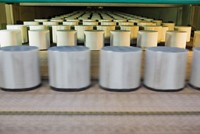Advertisement
Grab your lab coat. Let's get started
Welcome!
Welcome!
Create an account below to get 6 C&EN articles per month, receive newsletters and more - all free.
It seems this is your first time logging in online. Please enter the following information to continue.
As an ACS member you automatically get access to this site. All we need is few more details to create your reading experience.
Not you? Sign in with a different account.
Not you? Sign in with a different account.
ERROR 1
ERROR 1
ERROR 2
ERROR 2
ERROR 2
ERROR 2
ERROR 2
Password and Confirm password must match.
If you have an ACS member number, please enter it here so we can link this account to your membership. (optional)
ERROR 2
ACS values your privacy. By submitting your information, you are gaining access to C&EN and subscribing to our weekly newsletter. We use the information you provide to make your reading experience better, and we will never sell your data to third party members.
Inorganic Chemicals
Johnson Matthey to exit battery materials
Step ends one of the firm’s plans for countering the decline of the catalytic converter business
by Alex Scott
November 12, 2021

Johnson Matthey (JM), a leading player in precious-metal chemistry, says it plans to sell its lithium-ion battery materials business and exit the sector. The battery business was one of two the British firm was developing to counter an expected decline in its core business of making automotive catalytic converters.
The company cites the rapid commoditization of battery materials and competition from “alternative technologies” as reasons for its exit decision. JM says it is making the move after a detailed review ahead of critical investment milestones.
JM was developing a nickel-rich cathode material it called eLNO. It has invested about $200 million in R&D to develop the cathode material and has valued the assets of the business at about $450 million. The business has about 430 employees, most of whom are based in the UK.
The firm had been planning to open a 10,000-metric-ton-per-year cathode material plant in Poland in 2024 and had already begun planning the construction of a second, bigger plant.
Until now, JM had been touting the cathode material as helping it transition away from its main business of selling catalytic converters, which is expected to decline as the world transitions away from combustion-engine vehicles.
In an interview with C&EN earlier this year, Johnson Matthey’s CEO, Robert MacLeod, acknowledged the high cost of investing in battery materials and said its other new business—providing technology for making low-carbon and carbon-free hydrogen—requires much less capital. Still, MacLeod expressed confidence in the cathode material’s potential for success.
JM’s exit from battery materials raises questions about how the company can replace income from its catalytic converter business over the long term, according to a report published by Jefferies Group, an investment firm. “Ultimately, the challenge remains,” the report says.
Jefferies expects JM will have to write off much of what it has invested in the battery business. “We question the ability to realize much value from the £340m [$450 million] net asset base,” the report says.
In a separate announcement, JM said MacLeod will step down as CEO on March 1, 2022, to be replaced by Bayer crop science executive Liam Condon.





Join the conversation
Contact the reporter
Submit a Letter to the Editor for publication
Engage with us on Twitter